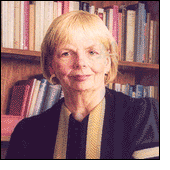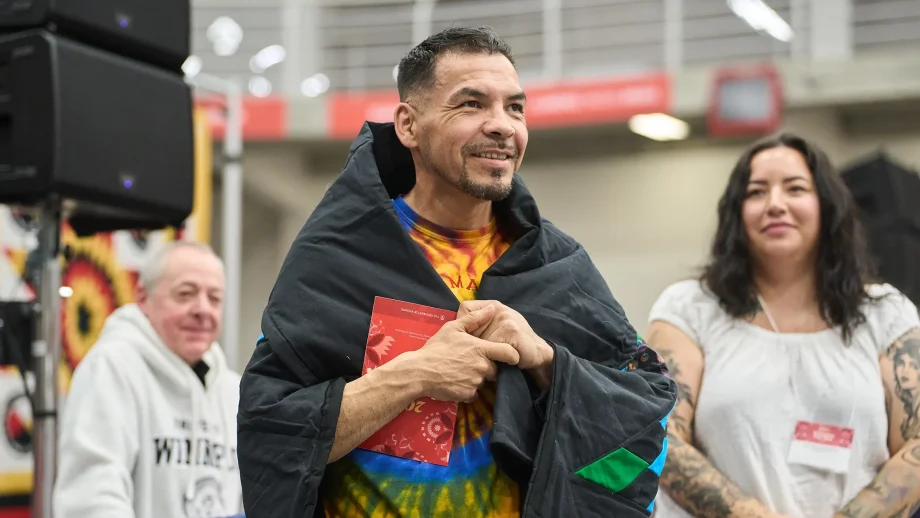(Reproduced from the Alumni Journal, 1998 Spring/Summer edition)
She is gracious from the moment you enter her home. As she takes your coat, she apologizes for having broken her coffee maker just yesterday, and says she will make you tea. This is a good thing if you are already quaking at the prospect of interviewing the woman who is, arguably, today’s most important Canadian writer.
Carol Shields, pouring tea at her own kitchen table, is everything you’ve heard she is. Warm, personable, genuine. There is intensity underlying her words, but no trace of pretense or turmoil.
In years to come, it is easy to imagine that she will confound carnivorous biographers in their ravenous search for deep, dark secrets. What little gossip you’ll hear about her is confined to the details of her domestic life. There is, for example, a rumour that she cooks porridge every morning for her husband, Don. Even when she tours, she leaves serving-sized portions to be defrosted and reheated. That kind of traditional domesticity may seem quaint, but it’s not much on which to base a tell-all paperback.
She laughs when you tell her she’s just so, well, normal. But she agrees it is true. “I don’t have a lot of old angers to work out like some writers do,” she confides.
Nonetheless, the last few years of her life have been anything but normal. A maelstrom of celebrity has swirled around her since she won the Pulitzer Prize in 1994 for The Stone Diaries. It reached a fever pitch this past fall when her latest novel, Larry’s Party, was published. Reviews of the novel appeared in every major Canadian publication-two, in fact, ran side-by-side in the Winnipeg Free Press. Across and outside Canada, interviews with Shields were carried in newspapers, magazines, over the radio and on the internet. The award nominations and public appearances seem endless.
After decades of solid, respectable professional success, suddenly Carol Shields is everywhere.
But if the hectic pace of celebrity is taking its toll on her, it doesn’t show when you sit across her kitchen table. She is quick to note that all this attention really hasn’t altered her life. “It seems like it’s happening to someone else,” she says. “My life hasn’t changed. I’m still married to the same man, I still have the same friends, I still live in the same place. The phone might ring a little more often, but that’s about it.” Fame, she explains, is something you leave outside the door when you come home.
After all, it’s not fame or awards or prestigious titles that really matter to her. It is people who matter to Carol Shields.
She refers to family, friends, and acquaintances often in conversation, and their words clearly carry great weight. On the day she was installed as The University of Winnipeg’s fifth chancellor, she explained what had compelled her to accept an offer that initially stunned her: “I discussed the idea, which was still no more than idea, with a friend, and her advice was: think about who you’ll be working with. This was good advice, I thought.” While she didn’t know exactly what her role as chancellor would involve, she knew she liked the people here. Combined with her love of universities, it was enough to clinch the deal.
Her writing, too, seems to be as much about connecting to other people as it is about putting words into print. Take, for instance, her comments on “The Orange Fish,” a framed lithograph that swims over her mantelpiece and served as the focus of the title story in her 1989 collection of stories. “When The Orange Fish was published, I expected to hear from others who owned this print. I was surprised that I didn’t,” she recalls. “Then when he book came out in paperback, I thought ‘now for sure I’ll hear from someone.'” She never did, and her disappointment is evident.
Shields still relishes the chance to connect with strangers, and today those links are made easier by technology. She is excited by an invitation from the New York Public Library to lead an on-line book club discussion on Jane Austen’s Mansfield Park this winter. For the project, Shields will post an essay to the club, then spend a week discussing the novel in the chat room. (Jane Austen figures prominently in her future projects. Shields recently signed a contract to write Austen’s biography for Viking Penguin.)
Far from being one of those who decry electronic conversations as impersonal or glib, she believes, as she has heard said, that email is “somewhere between a phone-call and a letter,” and she has embraced it as a way to stay in touch with family and friends.
Email has also proved useful to the process of writing and publishing. Shields and her overseas editor completed all the editing of Larry’s Party over the internet. “I loved it. It was so efficient,” she says. “Changes that once would have taken weeks to go back and forth could be done instantly.”
These technological marvels are a far cry from the manual typewriter on which Shields wrote her earliest novels. I used to use scissors and Scotch tape to cut and paste,” she recalls. The first of those laboriously constructed manuscripts remains unpublished. Although Shields received “enthusiastic rejection letters” through her attempts to publish the literary mystery, she eventually realized that no amount of Scotch tape could make the novel work. Future biographers take note: it now languishes somewhere in an archive.
Her next literary mystery, Swann, fared much better. Published in 1987, that novel remains her personal favorite-an “endlessly expandable” novel that she felt brave writing. “I was afraid people would say ‘this isn’t like her other books,” she remembers, then laughs, “and they did.”
So many successes later, fear—or perhaps courage—remains an integral part of the writing life. “[The success] doesn’t mater when I sit down in the morning. I still have that fear that maybe I can’t do it again.” She notes that some mornings, everything can go very well. Or it can go not very well at all. Either way, her writing takes her by surprise. “That’s the part you can always count on.”
Her stories are driven by the characters she creates—characters so full of conflicting desires, mundane confusions, small idiosyncrasies, and moments of brilliance—that they feel like real people. However, she is emphatic that all are fictional creations. Her intrinsic respect for people prevents her from reconstituting their existence on the printed page. Even if she hears something that is simply too good not to use, she always asks permission first. “I’m very careful about that.” It is a point of pride for her that no one has ever said, “I think this is me,” about one of her characters.
When she began to write Larry’s Party, Shields was interested in exploring the experience of being male in the latter part of the 20th century. (Much was made of this focus on maleness when the book was published, and reviewers generally agreed that she pulled it off. For her own part, she says that the process didn’t really bring her any closer to understanding men in general. “They will always be the other for me.”)
She also knew from the outset that she wanted to end the novel with a party, although what kind of party wasn’t evident until she arrived there. “The old Greek epics always end with a banquet where all the enemies come together,” she explains. “They’re not enemies coming together at the end of Larry’s Party, but all the threads of his life coming together in a kind of resolution.”
Coming together is an important concept for Shields. Writers, she says, cannot work in isolation. “It’s very important for writers to get together. Writers have to feel they’re a part of a community, or they lose faith.”
She and Don frequently entertain friends in their home, and Shields has developed a reputation as an exemplary hostess. She says she throws dinner parties not to show off her culinary skill—she describes herself as an “adequate cook with periods of enthusiasm”—but because she loves the idea of people sitting around a table, talking. “When we lived in Vancouver, people entertained in restaurants. When we came to Winnipeg (in 1980) we were quite delighted to find that people used their homes to entertain.”
Despite her obvious affection for Winnipeg, she and Don will move to British Columbia when he retires next year as dean of engineering at the University of Manitoba. There, they can indulge their passion for walking year-round. Still, it is difficult for her to imagine leaving Winnipeg, a city she says consistently surprises her because it has the feel of a village despite its size. “It’s so easy to be connected to other people here, don’t you think?” It is equally difficult to imagine Winnipeg without Shields, whose novels have portrayed our community in its best light, a place where people’s lives are inextricable interwoven.
Toward the end of our conversation, the phone rings. (The phone rings often, and every caller is greeted with enthusiasm.) This time, the call is for Chancellor Shields. Would she agree to contact two honorary degree recipients and ask them to accept the honour at next fall’s Convocation? Shields is more than agreeable—she is thrilled. “Who wouldn’t like to call someone and tell them such good news?” she asks. This is clearly the thing that delights her most—not the large, prestigious title of chancellor, but the small ceremonial duties that connect her to others.





